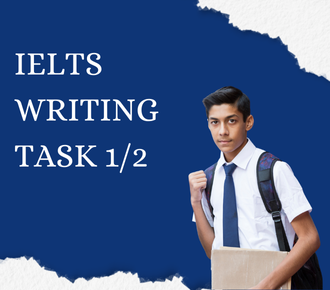- 9:30am - 6:30pm, Mon - Sun
- +91 7836034313
- R2-149 first floor M3M Cosmopolitan, sector 66 Gurugram 122102

The IELTS Writing test is one of the most challenging parts of the IELTS exam. Many students find it difficult because it requires not only good grammar and vocabulary but also strong organization, logical flow, and time management.
In this detailed guide, you will find everything you need to excel in IELTS Writing in 2025, including:
A breakdown of the IELTS Writing syllabus
Practical IELTS Writing tips to improve speed and accuracy
Structured IELTS Writing notes for exam success
Priority chapters and practice areas
Past year questions (PYQs)
Common mistakes to avoid
A downloadable IELTS Writing checklist to track your preparation
Helpful resources like tutors, free trial classes, pricing options, and home tutors in Gurugram
The IELTS Writing section has two tasks that test your ability to present ideas clearly, logically, and with correct grammar and vocabulary. The total time for both tasks is 60 minutes.
Task 1:
Academic: Describe visual data (charts, graphs, diagrams, tables, or processes).
General Training: Write a letter (formal, semi-formal, or informal).
Task 2:
Both Academic and General: Write an essay (250 words) on a given topic.
Essay types include opinion, discussion, advantages-disadvantages, problem-solution, or double-question essays.
The IELTS Writing syllabus can be divided as follows:
Task 1 (20 minutes, 150 words): Summarize or describe a graph, chart, table, map, or process.
Task 2 (40 minutes, 250 words): Write an essay presenting arguments, evidence, and examples.
Task 1 (20 minutes, 150 words): Write a letter based on a given situation.
Task 2 (40 minutes, 250 words): Write an essay on a general issue, similar to Academic Task 2 but less technical.
Task Achievement (how well you answer the question)
Coherence and Cohesion (structure and logical flow)
Lexical Resource (vocabulary)
Grammatical Range and Accuracy (sentence variety and correctness)
Here are key IELTS Writing notes that will help you prepare:
Task Priorities
Spend 20 minutes on Task 1 and 40 minutes on Task 2.
Task 2 carries more weight (66% of the score).
Essay Structure
Introduction: Paraphrase the question and state your thesis.
Body Paragraphs: Each with one main idea, supported by examples.
Conclusion: Summarize without repeating words.
Linking Words
Use connectors like: "Moreover," "On the other hand," "For example," "Therefore."
Vocabulary Bank
Academic words: "Significant," "Impact," "Demonstrates," "Illustrates."
Essay-specific phrases: "It is widely believed that," "One possible solution is."
Time Management
Always leave 3–5 minutes for proofreading.
Here are practical IELTS Writing tips to improve your performance:
Tip 1: Always analyze the question before writing. Identify keywords.
Tip 2: Do not copy sentences from the question. Paraphrase instead.
Tip 3: For Task 1 Academic, avoid giving personal opinions. Focus on describing data.
Tip 4: For Task 2 essays, balance arguments with examples.
Tip 5: Use a mix of simple and complex sentences.
Tip 6: Avoid informal language in essays, even in General Training.
Tip 7: Practice writing essays in 35–37 minutes to save time for review.
Tip 8: Use tutors for personalized feedback and corrections.
Understand the IELTS Writing syllabus – Know the format and expectations.
Task 1 Practice – Describe data, graphs, and letters.
Task 2 Essay Writing – Focus on essay structures and thesis statements.
Vocabulary Development – Learn academic and topic-specific words.
Grammar Refinement – Practice tense consistency, articles, prepositions, and complex sentences.
Time Management – Practice completing tasks under exam conditions.
Proofreading Skills – Learn to catch spelling and grammar errors.
The graph below shows the percentage of households with internet access between 2000 and 2020. Summarize the information.
Describe the process of producing electricity from wind energy.
Write a letter to your landlord explaining a problem with your apartment and requesting repairs.
Write a letter to your friend explaining why you cannot attend their birthday party.
Some people think that governments should invest more in public transport. Do you agree or disagree?
Discuss the advantages and disadvantages of online education.
In many countries, people are choosing to live alone. What are the reasons, and is it a positive or negative trend?
Some people believe that the media has too much influence on our lives. To what extent do you agree?
Writing fewer words than required – This lowers your score.
Memorizing essays – Examiners quickly recognize rehearsed answers.
Poor paragraphing – Long blocks of text are hard to follow.
Overuse of simple vocabulary – Repetition affects the lexical score.
Ignoring Task 1 details – Always include key trends and comparisons.
Weak conclusions – Never end abruptly without summarizing.
Spelling and grammar errors – Proofread carefully to avoid mistakes.
✅ Review IELTS Writing syllabus
✅ Practice Task 1 and Task 2 weekly
✅ Build a vocabulary list for essays
✅ Practice 2–3 essay types daily
✅ Use linking words in every essay
✅ Leave 5 minutes for proofreading
✅ Attempt PYQs under timed conditions
✅ Get feedback from tutors
✅ Track improvement with a progress chart
👉 [Download IELTS Writing Checklist PDF]
Book a free trial class to experience live guidance
Check pricing plans for flexible packages
Hire home tutors in Gurugram for personal coaching
The IELTS Writing section requires consistent practice, vocabulary development, and the ability to structure ideas clearly. By following this guide, using the syllabus, practicing PYQs, and applying actionable IELTS Writing tips, you can significantly improve your writing band score.
Start today with our free trial classes and take the first step toward mastering IELTS Writing in 2025.








